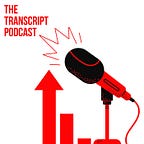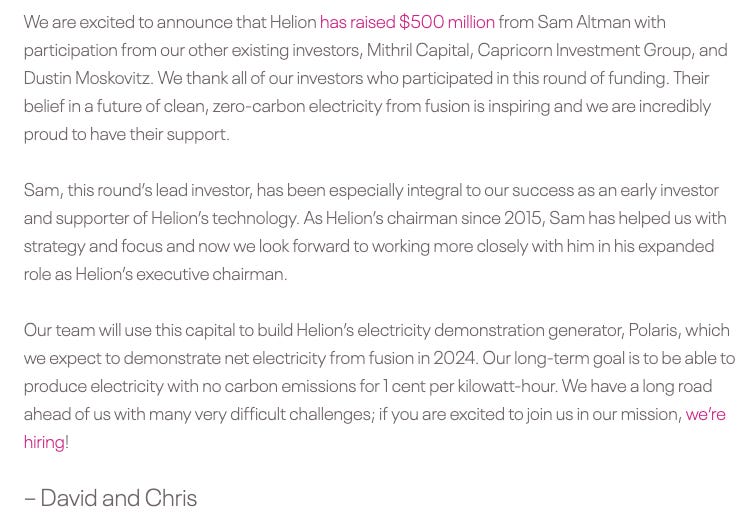Episode Summary: In this episode, we discuss the Fed's tapering and desire to raise rates soon, the signs of normalization from various consumer trends, and fusion energy as a way to power our future energy needs.
The episode is based on yesterdays’ newsletter which is available here:
A transcript of this podcast, with relevant images and quotes, is available for subscribers only after the show notes below.
Show Notes:
00:00:00 Introduction
00:00:16 Tapering Begins
00:04:02 Will they raise rates soon?
00:04:22 Normalization trends in consumer markets
00:08:22 The world can count on fusion
Show Notes:
Introduction
[00:00:00] Scott: Welcome everyone to a new episode of the transcript podcast. You've got me; Scott, Chris loft. I'm the editor of the transcript, along with Erick Mokaya who's the lead author. We sent out a new issue of the newsletter yesterday and had a focus last week on the federal reserve meeting.
Tapering Begins
"...the focus at this meeting is on tapering asset purchases, not on raising rates. It is time to taper, we think, because the economy has achieved substantial further progress toward our goals measured from last December. We don’t think it’s time yet to raise interest rates. There is still ground to cover to reach maximum employment, both in terms of employment and in terms of participation." - US Federal Reserve Chair Jerome Powell
As I'm sure most people saw, the federal reserve decided to begin to taper asset purchases. But overall remain very devish. Interest rates are still at zero and not expected to increase anytime soon. And all of this was despite the fact that Jerome Powell did say that the level of inflation we have is not at all consistent with price stability and also that there are signs of a “really strong labor market”. Yet, the federal reserve continues to maintain an easy managing policy because it's talking about not having achieved maximum employment which is a nebulous term that they're not really defining. Eric, any thoughts on any of that?
[00:00:56] Mokaya: I think I have more questions than answers. And I think since you spent a lot of time yourself on the transcripts with the federal reserve, you`ve read a lot about them. Have you seen any changes in terms of maybe the tone about raising rates going forward? Because; the explanation they give that it doesn't think like it's controversial to not raise rates, but everybody seems to think like, it is actually controversial for them not to raise rates at this point in time. Like, what exactly is their thinking there? What, what do you get about that?
"I do think it would be premature to raise rates today. That’s not -- I don’t think that’s controversial. Certainly, I don’t know anyone arguing for that today. And the reason is that there’s still ground to cover to get to maximum employment." - US Federal Reserve Chair Jerome Powell
[00:01:26] Scott: Yeah, I mean, I think 12 years of an effective zero interest rate policy has taught everybody who's operating capital markets that you shouldn't fight the Fed and that the Fed is going to be leaning towards a very easy money policy. And everybody's just kind of watching and no sign of changes I guess.
"We are prepared to speed up or slow down the pace of reductions asset purchases if it’s warranted by changes in the economic outlook. And again, if we feel like something like that’s happening, then we’ll be very transparent. But we wouldn’t want to surprise markets." - US Federal Reserve Chair Jerome Powell
[00:01:46] Mokaya: I think the last bit of the quote that we highlighted was about them not wanting to surprise the markets. I think that was what maybe they are going for. So I think the expectation would be for them not to raise rates for a little while longer. And when they do that, they will give express notice to the market. So there is no taper tantrum, like last time. I think that would be maybe what is informing, how they are going forward. But I think right now, everybody kind of agrees that this is so late in the cycle, they should be raising rates at this point in time. I think every company that you read, especially in the financials real estate sector, they actually are expecting that they should raise rates soon.
“I personally think the flat rate scenario that everybody is projecting is overstated. The underlying strength of our economy is not great, but it’s good. The Fed, I believe, clearly knows they need to raise rates, and I think they will the minute they see a window, which could still easily happen at least one rate increase towards the fall.” — BB&T chairman and CEO Kelly King
But then again, there's a day I went back to copies of the transcripts, maybe from 2016. And I actually found out banks were still expecting in 2016, but the Fed was going to raise rates. So it was just surprising that back then they were saying in the next seating, they are going to raise rates. So I think this is five years later and we're still hoping for them to raise rates. So we are pretty much stuck in a rat, so to speak. What do you think there?
[00:02:52] Scott: Yeah, I mean, I think for the last 12 years, There has been this psychology that we're in deflation, even though the data doesn't support, that there's been any real deflation happening in the U S there's still been positive inflation over all of those years, but the mindset is that we are trending towards deflation. And so the Fed had to maintain an easy money policy. Today we're very clear on the experience. Again, inflation, you know, five, 6% inflation. But then again, the narrative is around. Oh, well it's just transitory inflation and then, oh, well it's not transitory but it's just episodic inflation.
And I mean, the federal reserve just seems very intent to not at all address the inflation that it's seeing in the economy and just say, you know, we think things are going to get better, but then printing money into this is not a way to be addressing inflation at all. And an emergency monetary policy in this environment feels somewhat irresponsible or at the very least, not at all data-dependent. And I think that is a major concern as a citizen.
Will they raise rates soon?
We don’t think it’s time yet to raise interest rates. There is still ground to cover to reach maximum employment, both in terms of employment and in terms of participation." - US Federal Reserve Chair Jerome Powell
[00:04:01] Mokaya: Yeah, I agree. Totally. But, is there any indication from the transcript that when they are likely to raise rates?
[00:04:09] Scott: Yeah. I mean, I think the federal reserve is being very clear that they don't expect to raise rates until sometime next year. So the easy monetary policy will persist for a while.
Normalization trends in consumer markets
“...with cases on the downswing, we have built -- quickly we built momentum into October and the level of demand in the marketplace, especially on the weekends has simply been incredible. October will be another all-time record month." - MGM Resorts International (MGM) CEO Bill Hornbuckle"...a combination of variants, increased employment opportunities and compensation, along with fatigue, have all led to significantly fewer enrollments than expected this semester -- Nobody could have anticipated just the robust nature of the low-end economy where our kind of students, community college students, four-year students and schools that most of you don't know about, chose to go earn an income or stay home with their child versus go back to school this semester." - Chegg (CHGG) CEO Daniel Rosensweig
[00:04:22] Mokaya: All right. Anything else that you may have picked from this week's quotes? We had a lot of them, especially in the consumer section. If you can pick a few, then we can break them down as we go forward.
[00:04:31] Scott: Yeah. I mean, I think the consumer section showed the juxtaposition between what's happening in the real economy and with federal reserve policy where a federal reserve policy is very much focused on an emergency response and the consumer economy is jumping right back into where it used to be in 2019. So you're seeing kind of the last fringes of the economy. Healing with things like people returning to gyms, Airbnb seeing a pickup in demand in urban areas, Uber seeing strong demand for bride share, Vegas bouncing back.
And then you're also seeing some beneficiaries of the pandemic seeing headwinds. So like Peloton experiencing a post-pandemic slowdown, Chegg is talking about people not investing as much in their education. So you're seeing this like final, complete normalization of the economy that is showing up in earnings calls right now. Any thoughts there?
"People are choosing bricks and mortar. They’re coming back faster than we’ve ever seen. They’re rejoining our clubs faster than we’ve ever seen. The Gen Z’s are joining faster than we’ve ever seen. All the winds are blowing the right direction, and the sails are wide open." - Planet Fitness CEO Chris Rondeau"It is clear that we underestimated the reopening impact on our company and the overall industry --.While we continue to see a nearly 100% two-year growth CAGR in both traffic and unit sales in Q1 and into Q2, we've seen a greater-than-anticipated taper of our website traffic levels over the past two months and a slower-than-expected pickup in retail showroom traffic, both of which are important inputs into our forward-looking demand mode." - Peloton Interactive CFO Jill Woodworth
[00:05:29] Mokaya: Yeah, I agree on that. The companies that experienced really tailwinds during the pandemic are actually experiencing slowdowns, as you've noted. One of them that I have also been observing very keenly is Peloton. And I think one of their quotes from the CFO was actually very telling. It says that they underestimated the reopening impact in the company and the overall industry. So if you put a side-by-side Peloton, and Planet fitness, they show you the trend of the economy. So Peloton is experiencing headwinds. As the economy opens, they are experiencing slowed-down traffic on their website. While Peloton is experiencing headwinds. We can see a company like Planet Fitness is experiencing tailwinds. As people move back into the gym. Airbnb is experiencing demand in urban areas. People are moving back away from suburban areas. As you say it tells you that the economy is reopening and things are actually almost normalizing. And I think a couple of weeks ago we saw a quote that says that people are now learning to live with the pandemic. Like it's not something that is going to be wholly disruptive to people's lives going forward. Of course we continue to see issues with the supply chains. As we head into the holiday season, I think it's a very key thing to note. The quote from FreightWaves CEO that said that people may actually be forced to go to stores this holiday actually, instead of shopping online more than you'd normally expect them to. So I think that's something notable. Anything else that you may have noted yourself?
"The housing market is returning to sustainable levels and oh what a relief it is. Year-over-year price gains peaked in May 2021 at 24% and have narrowed every month since to 13% in September. In the hottest pandemic markets, like Boise, Salt Lake City, and Tacoma, more than 40% of the listings on the market have dropped their price, when earlier this year that number was below 12%. From April to September, the percentage of Redfin’s offers facing competition decreased from 74% to 59%.” - Redfin (RDFN) CEO Glenn Kelman
[00:06:54] Scott: Yeah. Two other areas of normalization that are noteworthy. One in housing markets, Redfin mentioned housing markets are starting to normalize now. That means the price level is going up by only 13% instead of 24% a year, which is still a massive jump in home prices. But that's another sign where, like Chegg or Peloton, where people are focusing more on experiences, again, going out, traveling, rather than the intense focus on the home. You're seeing a bit of a shift away from, from housing spent there potentially. And then the other area, which I just think is kind of comical where there's no normalization is on the work from homework, work from the office front.
Where I think companies still kind of want to try to get their people back in offices. But I think that employees don't really want to go back into the office, they want to be able to still have the flexibility of working from home. And so I think it's really that balance where Yeah, but people have no problem getting on a plane, but don't want to get on a plane for work. That's making the nature of work change and is probably going to have the nature of work changed for the longer term because of that. So I thought those were two interesting areas.
The world can count on fusion
"This funding ensures that Helion will be the first organization to generate electricity from fusion -- Our 6th prototype demonstrated that we can reach this pivotal milestone. In just a few years we will show that the world can count on fusion to be the zero-carbon energy source that we desperately need.” - Helion Energy Founder and CEO David Kirtley
[00:08:06] Mokaya: Yes, and I think one final bit is, let's talk a bit about fusion and I mean, one of the quotes we picked up there was that we need more backup for solar and wind as energy sources. And I think one of the new energy sources is fusion. Maybe you can tell us a little bit more about that?
Source: Helion Energy
[00:08:22] Scott: Yeah, thanks for teeing up for me, Erick. So some listeners may know that the transcript is a side project for me. My actual day job is as Chief Business Officer at Helion Energy, which we're a fusion startup, based out of the state of Washington. And we had some big news last week, we actually closed our series E fundraise. It was a $500 million fundraise with opportunities for an additional $1.7 billion in funding. And we also made a very important announcement that we are expecting to generate that electricity from fusion in 2024 which means that we will have our first demonstration fusion power facility in 2024. And this is something that I wanted to make sure that it was highlighted for listeners of the transcript. Not just because it's important and it's something that I'm working on, but also because this will potentially have major economic impacts and investment impacts in the energy space. I don't expect us to move markets in the near term, but I think this is something that people will recognize more and more in the not-so-distant future.
[00:09:28] Mokaya: I think it's good to say congratulations on that. But then again, just to ask in the same breath, I should ask the question, what is fusion energy for the uneducated like me?
[00:09:37] Scott: Sure. Thanks. No, I appreciate your asking that. So fusion is the opposite of fission. It's a form of energy where you actually combine two atoms together and you get energy out of it. fission you split it out of a part and get energy out of it. So fusion is the same energy source that powers our sun. And you take two atoms that you can find in water. It's a form of hydrogen called deuterium. You fuse them together and you're able to produce energy and a bottle of water containing deuterium water would be able to power a home for 800 years. So it's incredibly energy-dense. It also, you know, as opposed to fission, no risk of meltdown, no long-lived radioactive waste. And it's been this holy grail of energy for a long time. People have been trying to do it for several years, but have never been able to do it successfully on earth. And so we're making really great strides here at Helion and again we expect to have her first demonstration facility in 2024.
It's an energy source so cheap and clean and plentiful that it would create an inflection point in human history, an energy singularity that would leave no industry untouched. Fusion would mean the end of fossil fuels. It would be the greatest antidote to climate change that the human race could reasonably ask for.- Lev Grossman, Lead Technology Writer, Time Magazine
Source: Inside the Quest for Fusion, Clean Energy’s Holy Grail
[00:10:34] Mokaya: All right. Congratulations once again. The energy space is something we'll be paying very close attention to. You notice in the recent past the issues a lot of the companies are having are in this space. So it's exciting to see these good developments happening in this space so that we can be able to power the planet.
We will put some links to the transcript to this podcast, so that listeners can also be able to read a little bit more and also follow up on what you're doing. On that bright note, we'll end this week's podcast. Thank you listeners for joining us this week. We hope to see you again next week as we continue to cover all things related to earnings quotes.















